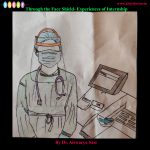Why indeed? The answer to this question changes over time. For instance, just before an interview for selection into medical college, the answer that almost all of us are repeating over and over again in our minds goes something like this: ’Ever since my –um- childhood, I wanted to help others. Um- and to heal them of their sicknesses and –um- diseases and also their illnesses. That’s why I –um- want to become a doctor to heal them-um. I want to –um- serve the poor and in the villages and –um- work hard. I want to ease their suffering. Health is very important. Um.’
Which, as people sitting on either side of the table know, translates as: ‘Let me become a doc. Then I’ll be on the first plane out of here, clear PLAB, put on flab, get myself a four bedroom mansion with a pool in the backyard and a couple of them German machines, one BMW and one Benz at least, in front, which will go a long way in easing my suffering. ‘
Fast forward to a couple of years, when on a dark and stormy night, there is a frantic hammering on the duty room door/ beep on your pager/ call on your mobile/ update on your Facebook status (depending on the era). It’s the much dreaded Casualty call. And you hear the same question: ‘Why did I become a doctor?’ The answer is rarely about the alleviation of suffering. More about that which must not be named in public forums. (or is it ‘public fora’?)
I remember an emergency call I had while working in a village in Kerala, fresh from internship. It was about 4:30 in the morning and in the Casualty was a small group of people sitting calmly. The problem was that the patient who used to get up at 5AM daily, had gotten up at 4AM. Was that normal?
“Four in the morning?” was what I could manage through the sleep laden haze.
“Yes”, was the answer. “Was there anything wrong with him?”
Of course there was! He gets up at five in the morning and calls that normal. Of course there was something wrong with him!
There is that phase in our medical career when we know everything, can do everything, can tackle any emergency and can provide updates on almost all medical textbooks. But then, internship doesn’t last forever. Our entry into the real world is often marked with an acute awareness of our limitations and how much we have to learn. Then there are those things that medical school can never prepare us for. I remember during our ophthal OT, the surgery being done was enucleation for retinoblastoma. The patient was a child whose other eye had already been removed for the same condition. We know the aetiology, pathology, signs and symptoms, treatment, prognosis but unfortunately that’s all we know. We can never know the shrunken world the child is entering. We can never tell the parents of a child on the ventilator that the life support has to be removed because they can’t afford to pay. Talking to the family of a patient of renal failure who can barely afford the cost of dialysis is not easy. Telling the mother who has presented with decreased foetal movements that her baby doesn’t have heart activity any more. Explaining the cost of medical care to people who can ill afford it. And these are skills we are not taught. We are just expected to know. Becoming a doctor entails a lot of things- knowledge is one of them but there are other things also.
I have often wondered what makes a patient have so much faith in his doctor. What makes him feel that a visit to his doctor will miraculously cure him of his pain or disease. I suppose there is no answer to that. That is something we experience when we or our family members are in pain.
Anyway, now today, if we were to ask ourselves the same question- why did we become doctors? – what will our answer be? I think that there will be a similar bottom line- helping others. To heal. Some of us have that pool in the backyard and so on. I feel that if there is a call from the hospital or clinic or wherever we are working, we will get out of the pool, into the German automobile and go. We might complain all along but we will go. I like to think that. And probably, the answer we were trying so hard to recite at the board interview, might after all be the right one.
-Biju James, Radiologist, UAE













Interesting article. Well said Dr. Biju. I can so identify with this
Had an experience similar to what you have written, during my rural posting in Kerala 🙂
Thanks Sachin.
Thanks Dr.Biju, for provoking my thoughts and waking me up from my slumber.Dr.elsa
Maybe we need to add the other reason- respect n the high esteem that society gives the doctor more than an engineer or CA or bank manager!